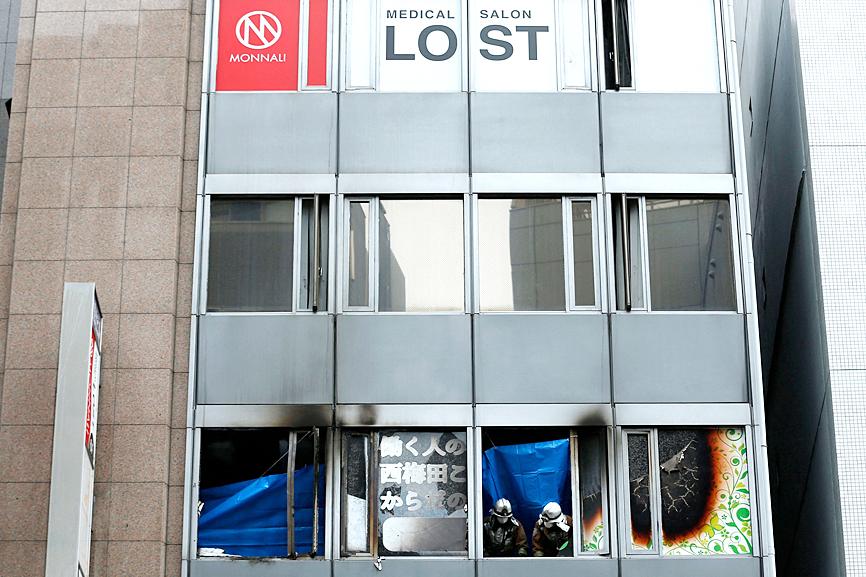At least 24 people were yesterday killed after a blaze gutted a mental health clinic in a commercial building in Osaka, Japan, local media said, with police reportedly considering the incident a possible arson.
The charred interior of the clinic was visible through blackened and broken window frames as firefighters put up tarpaulins to block the scene from view following the fire that broke out mid-morning and raged for half an hour on the narrow block’s fourth floor.
“The municipal fire department is investigating the cause of the fire. I have received a report that Osaka police is investigating the fire as a possible arson,” Osaka Governor Hirofumi Yoshimura wrote on Twitter.

Photo: AFP
Japanese media said a man in his 50s or 60s had allegedly dispersed a liquid to start the blaze.
A young woman who witnessed the fire told public broadcaster NHK she had seen a woman trapped on the fourth floor.
“She leaned out [from a window] and was saying things like ‘please help’... She seemed very weak. Maybe she inhaled lots of smoke,” the woman said.
Osaka, a major economic hub, is Japan’s second-biggest metropolis after the greater Tokyo region.
Japanese Prime Minister Fumio Kishida offered his “sincere condolences” to the victims and sympathy to those injured in the incident.
“We must get to the bottom of this horrible case. We must clarify the cause and how it happened, and we must take measures to prevent the same thing from happening again,” he said.
Dozens of fire engines rushed to the scene of the blaze, which occurred in a busy business area near Kitashinchi Station.
Most of the eight-story structure’s exterior remained intact after the fire, with about 20m2 reportedly burned in the blaze.
“There was lots of dark smoke ... there was a very strong smell, too,” a middle-aged woman told NHK at the scene.
Fuji TV reported that most of those who died in the fire were believed to have had carbon monoxide poisoning.
One year ago, a man was charged with murder over a 2019 arson attack on a Kyoto animation studio that killed 36 people, the country’s deadliest violent crime in decades.
A 2008 arson attack on a video shop in Osaka killed 16 people. The attacker is on death row.

TRAGEDY STRIKES TAIPEI: The suspect died after falling off a building after he threw smoke grenades into Taipei Main Station and went on a killing spree in Zhongshan A 27-year-old suspect allegedly threw smoke grenades in Taipei Main Station and then proceeded to Zhongshan MRT Station in a random killing spree that resulted in the death of the suspect and two other civilians, and seven injured, including one in critical condition, as of press time last night. The suspect, identified as a man surnamed Chang Wen (張文), allegedly began the attack at Taipei Main Station, the Taipei Fire Department said, adding that it received a report at 5:24pm that smoke grenades had been thrown in the station. One man in his 50s was rushed to hospital after a cardiac arrest

SAFETY FIRST: Double the number of police were deployed at the Taipei Marathon, while other cities released plans to bolster public event safety Authorities across Taiwan have stepped up security measures ahead of Christmas and New Year events, following a knife and smoke bomb attack in Taipei on Friday that left four people dead and 11 injured. In a bid to prevent potential copycat incidents, police deployments have been expanded for large gatherings, transport hubs, and other crowded public spaces, according to official statements from police and city authorities. Taipei Mayor Chiang Wan-an (蔣萬安) said the city has “comprehensively raised security readiness” in crowded areas, increased police deployments with armed officers, and intensified patrols during weekends and nighttime hours. For large-scale events, security checkpoints and explosives

PUBLIC SAFETY: The premier said that security would be tightened in transport hubs, while President Lai commended the public for their bravery The government is to deploy more police, including rapid response units, in crowded public areas to ensure a swift response to any threats, President William Lai (賴清德) said yesterday after a knife attack killed three people and injured 11 in Taipei the previous day. Lai made the remarks following a briefing by the National Police Agency on the progress of the investigation, saying that the attack underscored the importance of cooperation in public security between the central and local governments. The attack unfolded in the early evening on Friday around Taipei Main Station’s M7 exit and later near the Taipei MRT’s Zhongshan

A car bomb killed a senior Russian general in southern Moscow yesterday morning, the latest high-profile army figure to be blown up in a blast that came just hours after Russian and Ukrainian delegates held separate talks in Miami on a plan to end the war. Kyiv has not commented on the incident, but Russian investigators said they were probing whether the blast was “linked” to “Ukrainian special forces.” The attack was similar to other assassinations of generals and pro-war figures that have either been claimed, or are widely believed to have been orchestrated, by Ukraine. Russian Lieutenant General Fanil Sarvarov, 56, head